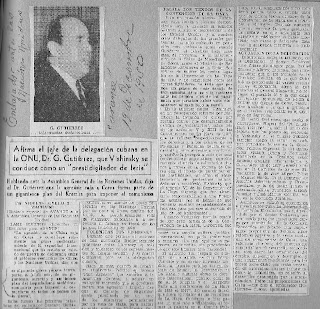
On December 19, 1950, Nicolas Rivero y Machado wrote an article for the Cuban newspaper, Avance, reporting that the head of the Cuban delegation to the Fifth General Assembly of United Nations, Dr. Gustavo Gutiérrez, had accused the Soviet Ambassador, Andrei Vyshinsky of conducting himself like a circus clown and declared that, "the aggression in Korea by Red China doesn't only constitute a worrisome rupture in international security, creating a non-declared state of war between China and the United Nations, but rather is something graver that forms part, in my opinion, of a gigantic, bold and ambitious plan by Soviet-communist imperialism to impose communism in all the nations of the world." The reporter added that, "Gutiérrez is one of the few delegates in the United Nations, perhaps the only one, that has destroyed Vyshinsky's pseudo legal argument, putting the former Stalin prosecutor of the Trotsky purges of 1938 on the defensive."
For a better resolution of the above original Spanish article, please see blog entry from January 2009 "GG Attacks Soviet Vyshinsky at the UN, 1950." My apologies for a less than adequate English translation below.
"During these sessions both the Soviet Foreign Minister, the most agile and talented representative of the Soviet bloc, and the head of the Cuban delegation confronted one another on numerous occasions. In defense of the newly created "Acheson Plan," which authorized the General Assembly to take action in case of an act of aggression on the part of a member nation, thus over-riding the veto power of any Security Council member, in this case that of Soviet Ambassador Malik, Gutiérrez infuriated Vyshinsky when the former exposed the contempt the USSR has for smaller nations. Gutiérrez stated, "If Vyshinsky's criteria was allowed to prevail the world would fall back to the times of the Congress of Vienna when a handful of great powers and influential statesmen imposed their will over Europe and reorganized the map of Europe at their whim."
"In addition, Vyshinsky, whose sarcasm and cynicism didn't fail to unnerve American ambassador, Senator Warren Austin, and other delegates, was put in his place when Dr. Gutiérrez accused him of falsely interpreting the legal texts of the 1907 Convention of the Hague and by conducting himself like one of those circus clowns that plays those "now you see it, now you don't" parlor tricks. And when Vyshinsky had the audacity to read certain Articles of the Hague Convention to justify China's invasion of Korea, Gutiérrez, who possesses a thorough knowledge of international judicial law couldn't contain himself and exclaimed, "the legal passage he is quoting is not correct, it's incredible, without precedent, what this man is doing!" The following day, with the assistance of fellow Cuban diplomats Guy Perez-Cisneros, Dr. Herminio Rodriguez, eminent judicial expert and Colonel Borel, a specialist on the Hague, Dr. Gutiérrez embarrassed Vyshinsky by discrediting his claim. Before a stunned audience Gutiérrez exposed the fantastic falsification of legal texts by the Soviet delegate. Gutiérrez quoted from A.P. Higgins' book, Article VI of the Hague Convention and revealed that Mr. Vyshinsky had substituted the word "individually" with "separately" with the intention of justifying China's invasion of Korea."
"Dr. Gutiérrez added that Vyshinsky omitted Article IV which prohibits a neutral country from getting involved militarily. And finally destroyed Vyshinsky's futile attempts to fool the delegates present by reading Colonel Borel's report which states that Article IV is concordant with Article VI which Ambassador Vyshinsky neglected to mention, which prohibits the crossing of national boundaries en masse by foreign military."
"Vyshinsky's response, two days later, was quite weak. He recognized that, "the delegate from Cuba is a parliamentarian who has a way with words," but counterattacked Gutiérrez for citing texts in English and French and not in Spanish, explaining that Gutiérrez's argument was invalid since the translation from Russian to French was incorrect. The Cuban delegate smiled widely and didn't respond because everyone knows that the only official languages of the Hague are French and English. Later, Gutiérrez commented that it wasn't worth the effort prolonging a debate in which such an aggressive and intelligent adversary had become so soft and deficient."
When asked about the other members of the Cuban delegation Gutiérrez had nothing but praise for Carlos Blanco and Alberto Espinosa who shared with him the duties in the Committee on Politics. Cuba was a co-sponsor of various important resolutions; to authorize General Mc Carthur to go beyond the 38th parallel; demand that Peking withdraw it's troops from Korea, a similar resolution to the one Soviet ambassador Malik vetoed in December (1949) in the Security Council. According to the N.Y. Herald Tribune's correspondent Rogers, "Gustavo Gutiérrez has been the only delegate to expose Vyshinsky in the Committee on Politics.
Gutiérrez also praised Francisco Ichaso (Special Committee on Politics), ambassador Manuel Baraña and Herminio Rodriguez (Commission on Social, Humanitarian and Cultural Affairs), Guy Perez-Cisneros (Commission on Fiduciary Affairs), José Miguel Ribas and Manuel Hevia (Commission on Administrative and Budget Affairs), Francisco Garcia Amador and José Manuel Cortina (Judicial Committee). Ambassador Gutiérrez, who was voted unanimously to preside over the Committee on Economics, also congratulated Julio Le Riverand for his work. In this committee an important proposal from Poland was debated regarding agrarian reform and the national rent, as well as, various proposals from Cuba: affects of commercial exchange on economic development; statistics on employment, sub-employment and unemployment and one very important proposal to underdeveloped countries such as Cuba who is trying to mechanize certain industries, ie., tobacco and it's affects on labor. "All of Cuba's proposals", Dr. Gutiérrez tells us, "were approved."




No comments:
Post a Comment